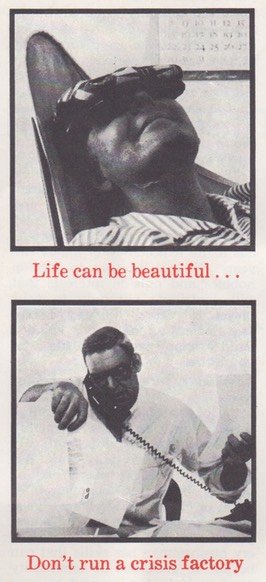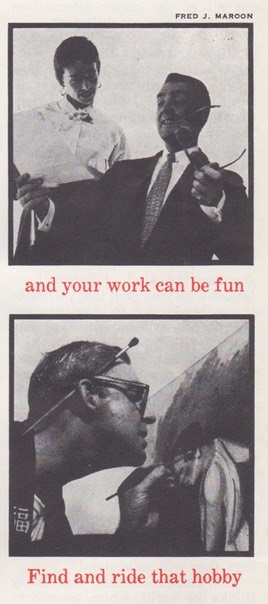The following interview (with Dr Robert Felix) is as pertinent today as it was when this article was written - sixty one years ago - in September 1956.
HOW TO LIVE WITH JOB PRESSURE
THE BUSINESSMAN is one of the nation's big mental health problems.
Of all the people in our tension-ridden modern society, none is subjected to more relentless stress than he. In the competitive environment in which he lives and works, nervous strain is the number one occupational hazard.
Each year thousands of able, ambitious, hard-working men are cut down in the prime of their careers by psychological and physiological ailments. Aside from the human tragedy which this entails for them and their famiIies, the cost to their business firms in terms of lost executive talent is incalculable.
The businessman can reduce this casualty toll.The place to start is with himself.
"You can't escape the ulcer factory environment in which all modern businessmen live," says Dr. Robert H. Felix, Director of the National Institute of Mental Health, "but there are some simple, common sense ways in which you can keep from cracking up under its strain and can preserve the kind of vigorous mental health which is so essential to your own, and your firm's success. I won't promise that these suggestions will lead to utter tran-quility. Any man who carries heavy responsibilities and wrestles daily with complex decisions is bound to do some worrying. He would be stupid, or indifferent, if he didn't. I'm not offering a magic formula for unruffled peace of mind but a few thoughts on how you can live with the inevitable stresses of your everyday life."
Dr. Felix, himself a busy executive, seems to be the ideal person to consult on this matter for several reasons. He has headed the National Institute of Mental Health, the federal government's great psychiatric research agency, since it was established at Bethesda, Md., 10 years ago. He knows from personal experience what the problems of management are, because he runs an organization with 370 employes and an annual budget of $35 million.
A friendly, hustling, eminently practical man who believes passionately in the product mental health that he is selling, Dr. Felix would feel as much at home at a business convention as at the meetings of the august American Psychiatric Association. He rarely lapses into professional jargon and always tries to give direct answers a trait that has endeared him to congressmen (who perennially show their regard for him and his Institute by increasing its budget ).
A final reason why Dr. Felix is worth listening to is that he has obviously practiced what he preaches, and has achieved, in his own life, the balance and fullness which he recommends for others. In private life, he is the head of a notably happy and close-knit family, an expert woodworker, a tireless contributor to community service projects, and a dedicated member of St. John's Episcopal Church in Bethesda, which he serves as an usher, Sunday school teacher, and member of the Vestry.
To cope with nervous tension, Dr. Felix says, you need to understand how it can cut your efficiency and, eventually, cripple or kill you.
"There are three ways in which a businessman may react unhealthily to stress," he says.
"He may begin to suffer from what we doctors call 'disorders of thought.' Under this category comes such familiar symptoms as indecision, anxiety, the kind of chronic worrying that leads to insomnia. It also includes the more serious neuroses, delusions and hallucinations.
"There also are disorders of behavior that are direct consequences of undischarged tension. Flying into rages, taking out spite on family or subordinates, drinking yourself into alcoholism, for example.
"Finally, there are disorders of bodily function the so-called psychosomatic ailments. Everybody thinks of ulcers in this connection but there are many other organic illnesses which may be caused or greatly aggravated by stress. Hypertension, coronary artery disease, colitis, arthritis - these are a few of the common ones.'
Dr. Felix paused, lighted a cigaret, and swung his chair around so that he could look out the window over the campus-like lawn of the huge Clinical Center, on the outskirts of Washington, which houses his own agency and six other components of the National Institutes of Health.
"I mentioned all those types of ailments," he continued, "because I want to get across the fact that mental health is not just a matter of thinking positive thoughts and gulping a few pills to quiet your nerves. To achieve it, you may have to do some fundamental re-orientation of your attitudes, your goals and your habits.
"Basically, it is a matter of ordering your whole life so that, insofar as possible, you make your work a pleasure instead of a burden. Keep your business career in perspective as an important, but certainly not the whole,of your existence.'
Making your work a pleasure sounds fine, but how do you go about it?
Isn't it a fact that almost every job involves tiresome, routine drudgery?
"True enough. But you may be surprised how much of your daily work can be lifted out of that category if you approach it properly. You might, for example, try to relate your job to a goal or purpose that is larger than your own narrow self interest. In other words, don't let your paycheck, or the next promotion, be your only motives for doing a good job. This may sound idealistic, but it is a well-known fact that a sense of being useful, of contributing something to the over-all welfare of mankind, is a vital factor in mental health. There is a lot of sound psychology in the old Rotary motto: 'He profits most who serves best.' And there is no legitimate business activity which cannot be used as a channel of service to society.
"There's another way in which you can find more enjoyment in your job
Look for a challenge - even in the most routine and uninspiring sort of task. While I was going to medical school, I worked part-time as a clerk in a grocery store. At first it bored me stiff. Then I learned to make a sort of game out of seeing how much of certain types of merchandise I could sell. When we stocked a new brand of canned peas, for example, I would tell every housewife who came in what wonderful peas they were, and how much they would dress up a meal. We sold a hell of a lot of peas, the boss was delighted, and I began to enjoy my job because I felt I was a salesman, and not just a clerk.'
What would you say to the man who has tried all of that, but still finds that his work is a tedious, Monotonous ordeal?
"I would suspect that he is in the wrong kind of job. Each of us is suited for certain kinds of work, and unsuited for others. This is getting over into the field of vocational guidance, which is another subject. But as a general rule, I'd say that no man can really enjoy, or achieve much success in a type of work that is completely alien to his interests and abilities. If you really hate the job you have, you probably aren't suited for it, and you ought to start looking for another one that you can be enthusiastic about.
"If that isn't immediately practical, you should make a special effort in the ways which we'll come to in a minute
to develop extracurricular interests that will supply the challenge and the satisfactions you are missing in your job.'
A secretary slipped into the room and deposited some papers on Dr.Felix's desk. He glanced through them briefly, One document apparently concerned a promotion and prompted a new thought.
"Promotions. That's where a lot of businessmen get into trouble. It is natural and desirable to go as far as you can in your field. But don’t overreach yourself. Every man has his limitations, know yours and stay within them. Not all men are cut out to be corporation presidents.There is nothing more tragic for the job or the man than the spectacle of the one-quart executive in the half-gallon job. The success cult of modern business, the constant drive to get ahead and stay ahead of Charlie, is one of the main things that produces man killing stresses.The fellow who keeps wangling promotions until he gets clear out of his depth will have to tread water furiously all the time. He won't be much use to his company and he’lI soon wear himself out."
When your job is well within your capabilities, it is possible to follow Dr. Felix's next suggestion, which is:
Develop a pace to do your day’s work, and, except in real emergencies, stick to it.
"The good distance runner knows that he can't sprint the whole route. He learns by experiment the pace that is right for him, that doesn’t wind him prematurely. That leaves him with the strength to put on a finish line kick. We all have crisis days, or weeks, when the schedule has to go out the window. But you can't operate on a crash basis all thetime. Learn to distinguish a true “drop-everything” emergency from an everyday front office flap, and don’t break your stride for the latter. Any intelligent boss should respect the subordinate who has the good senset o tell him occasionally: Im sorry,I just can't get to that tomorrow, but I'll have it by the next day.”
Don't waste today’s energy stewing over yesterday's decisions.
"There are several ways in which you can minimize the strain of making business decisions. Most of the top executives I know have consciously or unconsciously developed a credo, a set of fixed operating principles, which greatly simplifies their decision making process.
For example, if you sincerely believe that honesty is the best policy toward your customers and competitors (and I think it is) you can often resolve a problem quickly by ruling out all of the clever alternatives which you know are dishonest. "Give each decision the amount of study and worry that its importance warrants. It's amazing how often a man will fret over a comparatively trivial decision longer than he does over one that can affect the whole future of his business. Once you have made a decision, go on to the next item of business. If you find out later that you made a mistake, and there's still time to correct it, by all means try to do so, but if the die is cast, and you are clearly past the time when worry will help, don't spin your wheels.”
Develop the kind of personal relations with your staff that will makeit possible for you to blow your top occasionally without wrecking morale.
"I don't mean you should throw an ashtray at your stenographer every time you get the urge. This is illegal. Nor should you be a continual office grouch. But it can have a salutary effect on your mental health if you feel free, once in awhile, to give vent to some of the emotional steam that petty irritations build up inside of you. If, between times, you treat your people right, and let them know that you really respect them and their feelings, they will understand."
(Dr. Felix's secretary, who clearly thinks the world of him, assured us privately that he follows his own precepts in this regard.)
Don't take your business home with you.
"Of course, we all have to lug a briefcase home occasionally. But the man who does it every night is not an efficient administrator, even of his own time. The stress situation you endure at your office is tough enough on your health during a 40 or 50 hour workweek, if you constantly introduce it into the time which should be set aside for recharging your batteries, you are inviting serious trouble.”
Remember that you owe some time and vitality to your family.
"Find a hobby or a project that you can share with your wife and/or your Children. Common interests, shared enthusiasms, are the cement that holds a family together. Many a husband and wife have stumbled into tragic middle-age divorces just because the children have grown up and they find they have no interests left in common. They aren't really mad at each other - they just don’t know each other any more.”
Begin preparing now for retirement.
"I don't mean just buying annuities. Statistics show that the man who has been busy for years, and who just quits work and does nothing when he reaches retirement age, has a life expectancy of about two years. Now is the time to develop hobbies and outside interests that will contribute not only to your present relaxation but also will serve as a nucleus around which you can build a happy and useful life after you retire."
Community service can be a hobby,too.
"A lot of people have the idea that their off-duty activities, to qualify as relaxation, should be radically different from their daily work, But I've found that isn't true. Worrying over the budget of your church, or PTA, or civic club, is in fact a good change of pace from worrying over your company's balance sheet. Every businessman has skills that can be put to good use in community service. Volunteering part of your time and talents for unselfish endeavors is a fine way to maintain your balance."
Take at least one good vacation ayear.
"The bigger your job, the more break you need. A week-end holiday helps, but what you really need is to get away from it all completely now and then for a long enough time to refresh your mind and body.
I think the average business executive should take at least four weeks vacation a year - either in one hunk, or in two sections of two weeks each.
“Don't build all of your relaxation around alcohol.
"The thing to remember about alcoholism is this: You can develop a physical addiction to alcohol, just as you can to narcotics. Drinking to relieve nervous symptoms is as dangerous as Russian roulette.
"Don't badger your doctor for tranquilizing drugs.
"I hear reports about a lot of businessmen going to their family physicians and practically demanding a prescription for some of the new tranquilizers that have had so much publicity. Now these new drugs can be very valuable when they are used intelligently, to treat specific conditions, under the strict supervision of a doctor. But they are not 'happy pills' and they shouldn't be taken lightly. The American Psychiatric Association has issued an official warning that widespread use of these drugs to cope with common anxiety, nervousness and routine tensions is 'a public danger.' "
"I have one more thing to say. Strong and practicing religious convictions are a powerful contribution to emotional stability. I would never counsel any man to embrace religion simply because it would be good for his mental health. Such a faith would be superficial and insincere, a house built on sand. But I do advise that you think the matter through and decide what philosophy of life can give ultimate meaning to your existence.
You can accept religious faith as the answer - as I have - or you can reject it, but you cannot safely side-step a decision about it. I have never seen a really well adjusted person who had not resolved the question of his own religious beliefs."
EX LIBRIS DR DAVID LIVINGSTONE (1919-1970)




